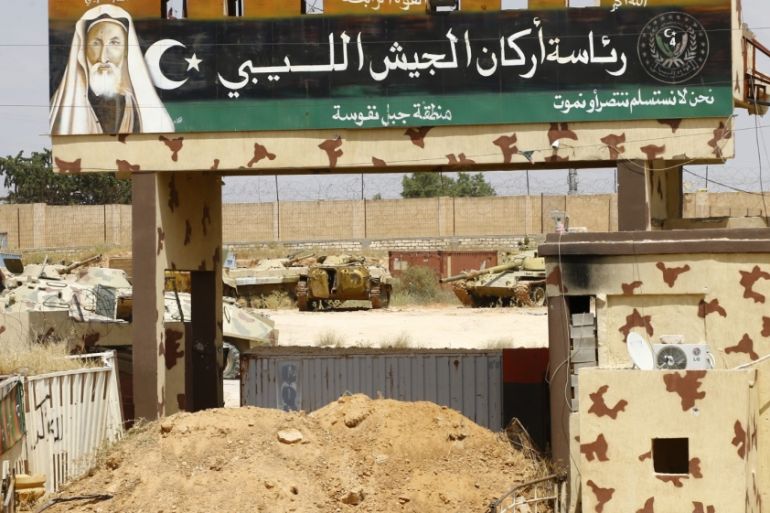Libya rivals reach deal to allocate positions in key institutions
Delegates in Morocco talks agree on ‘the criteria, transparent mechanisms’ for key posts.

Delegates from Libya’s rival administrations have reached an agreement at talks in Morocco on criteria for appointments to their country’s key institutions.
Dubbed the “Libyan Dialogue,” the discussions brought together five participants from the internationally recognised Government of National Accord (GNA), which controls the capital, Tripoli and the northwest, and five others from the House of Representatives (HoR), based in the eastern city of Tobruk.
Keep reading
list of 4 itemsCIA chief visits Libya after Lockerbie suspect handover
Libya: Violence to Votes
In Libya, anger and uncertainty after polls delayed
Following the meeting in Bouznika on Thursday, HoR’s Idris Omran read out a joint statement to reporters saying the delegates had agreed “the criteria, transparent mechanisms and objectives” for key posts.
He did not give further details but said the two sides would meet again during the last week of September to finalise mechanisms “that would guarantee the implementation and activation” of the agreement.
The naming of the heads of Libya’s central bank, its National Oil Corporation and the armed forces have been the main points of dispute, according to Libyan media.
|
|
Parallel to the Morocco talks, “consultations” took place in Montreux, Switzerland this week between Libyan stakeholders and members of the United Nations Support Mission in Libya (UNSMIL).
Held between September 7-9 under the auspices of the Centre for Humanitarian Dialogue, these meetings were a follow-up to a call made by the rival Libyan administrations on August 22 calling for an end to hostilities and nationwide elections.
The Montreux talks “provide a basis for all responsible Libyan stakeholders to forge the way forward”, said Stephanie Williams, the UN’s interim envoy to Libya.
Williams also welcomed the meetings in Morocco and said UNSMIL would try to prepare the ground to resume broader Libyan political talks.
“We call upon the international community to shoulder its responsibilities to support this process and to unequivocally respect the Libyan people’s sovereign right to determine their future,” she said.
Libya has endured almost a decade of violent chaos since the 2011 NATO-backed uprising that toppled and killed longtime ruler Muammar Gaddafi.
The oil-rich country has been split between governments in the east and west since disputed elections and an escalation in fighting in 2014.
The crisis worsened last year when renegade military commander Khalifa Haftar, whose forces control eastern Libya and are supported by Egypt, the UAE and Russia, launched an offensive to seize Tripoli, the seat of the GNA, an administration brought in by a UN-brokered deal in December 2015 after talks in Morocco.
Haftar was beaten back earlier this year by the Turkish-backed GNA forces and fighting has now stalled around the central city of Sirte, the gateway to Libya’s eastern oil fields and export terminals.